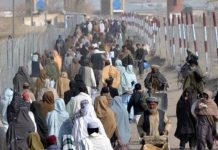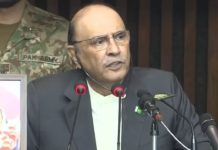By Qamar Bashir
The International Monetary Fund (IMF) has rejected Pakistan’s fiscal year 2023-2024 budget, calling it a “missed opportunity,” and has asked Pakistan to share budget specifics for inspection and reshaping before it is presented to parliament for approval. The IMF has expressed a number of reservations about the budget and has warned that until these concerns are addressed, the IMF would not deliver the next tranche of its $6 billion rescue package. This illogical rejection of Pakistan’s budget, which the incumbent administration anticipated would help stabilize the economy and stimulate foreign investment, was inappropriate and unwarranted. Our finance minister is confident that the country will survive even in the absence of the IMF, but independent economic wizards have warned that if Pakistan is unable to reach an agreement with the IMF, the country may face a debt default, which would have a devastating impact on the economy and could lead to political instability.
The IMF slammed the budget, stating that the fiscal deficit target of 6.54% of GDP is too high and should be reduced to 4.5%, that taxes on the wealthy and businesses should be raised, that spending on subsidies and the military should be reduced, that tax collection should be increased by 1% of GDP from 0.5%, that spending should be reduced by 0.5% of GDP from its current level of 0.2% and that the energy sector should be reformed by privatizing power distribution companies. The IMF warned Pakistan that if it fails to reach its budgetary targets, it may postpone the distribution of the next tranche of its loan, further straining Pakistan’s already frail economy.
The IMF’s hostile stance against Pakistan was also apparent in its absurd demands and requests that Pakistan take steps to minimize political polarization and foster consensus-building by establishing a national discourse on vital subjects such as the economy and security. It additionally pushed the government to improve the rule of law and ensure that all citizens are treated equally, as well as to reform the judiciary and police force. It urged the government to increase openness and accountability in government by passing legislation requiring government employees to disclose the assets they own and by establishing an independent anti-corruption body. It also demanded the government to protect fundamental freedoms such as free expression and assembly, and to abolish legislation that restrict these freedoms, as well as to ensure that security personnel do not use disproportionate force to disperse the protestors. These demands and conditions are incompatible with the IMF’s mandate, which was established to promote economic cooperation and financial stability and, as such, does not have a mandate to intervene in the political affairs of its member countries, particularly where the implementation of economic reforms can lead to political implications such as reducing budget deficits, which can lead to cuts in government spending, resulting in a negative impact on public services. The IMF is advising Pakistan on how to ensure democratic ideals, while the same IMF has been chastised for its role in backing authoritarian regimes. From 1966 through 1998, it backed Indonesia’s Suharto administration, which was responsible for massive human rights violations, including the deaths of hundreds of thousands of people. During the 1990s, it offered financial support to Argentina’s right-wing dictatorship, which was responsible for crushing opposition and human rights violations. It backed President Fernando Collor de Mello’s right-wing dictatorship in Brazil in the 1980s and 1990s, which was responsible for suppressing dissent and human rights violations, among other things. Its adversarial behavior also contradicts its basic beliefs, which require the IMF not to intervene in the political affairs of its member countries and, above all, to respect the sovereignty of a recipient country, which in the case of Pakistan has been flagrantly disregarded.
The government of Pakistan’s promises and pledges could not change the IMF’s tough stance; it even disregarded guarantees promised by China, Saudi Arabia, and the United Arab Emirates for the maintenance of combined deposits of $5.3 billion with the State Bank of Pakistan. China has also offered $1 billion in currency swaps, allowing Pakistan to use Chinese currency to meet its foreign exchange demands. Saudi Arabia has offered $1.5 billion in oil supplies on delayed payments, implying that Pakistan will not have to pay for the oil right away, but will be able to do so later, when its economy improves, while the UAE has given $500 million in cash. The recalcitrant IMF, however, did not value such enormous guarantees and refused a bailout package, despite the fact that Pakistan is a member of the IMF, which authorizes it for drawing privileges, and as such, the IMF is not doing any special favors to Pakistan.
On the other hand, the government had been serious and totally dedicated to meeting all legal IMF demands and denying only those where the IMF had no right to demand and had trespassed its mandate, such as interfering in the country’s sovereign decision making. The government also promised the IMF that it would take additional measures to increase revenue and reduce spending, as well as take tangible steps to reform its energy sector. However, given the government’s shady past behavior, the IMF may believe that mere pledges and promises are insufficient guarantees, and it now demands merit-based tangible and concrete guarantees that cannot be undone by any government. This is possibly an excessive demand, prompting Ishaq Dar, our Finance Minister, to rebut the IMF’s unreasonable demands, particularly political ones labeling them “unreasonable” and “unrealistic,” as the IMF was asking Pakistan to do things that were “not possible” and would “only hurt the people of Pakistan.”
Dar referred to IMF demands to raise taxes on the poor and middle classes, cut spending on essential services such as education and healthcare, privatize state-owned enterprises, and devalue the Pakistani rupee as highly irrational because they would harm Pakistanis and the economy. Rather than demanding unattainable and harmful reforms, he believes the IMF should concentrate on supporting Pakistan in improving its economy and creating jobs. He went on to explain that the IMF has no authority to compel Pakistan to lessen political polarization and enhance human rights. He stated that these were matters for Pakistan’s people to decide, and that the IMF should not interfere in Pakistan’s internal affairs. Many Pakistanis agreed with Dar, saying that the IMF was expecting too much from Pakistan. The IMF has declared that it is anxious to engage with Pakistan in order to reach an agreement, but Dar’s remark has made it clear that Pakistan will not accept the IMF’s demands without a battle, and Dar is a strong fighter and a difficult nut to crack.
He may have had many surprises in his pocket because no one knows better than him how important it is to sign a deal with the IMF because it would not only provide a lifeline to Pakistan’s struggling economy and balance of payment issues, but it would also unlock aides, loans, and deposits from friendly countries that would help Pakistan ease some of the stringent curbs on imports such as industrial raw materials, animal food, and industrial machinery which is vital for sustained economic growth. Import restrictions have already devastated major and small-scale industrial sectors and businesses, as evidenced by a survey of the economy, which revealed that these sectors were under severe stress.
It appears that the IMF, Moody’s, and other such institutions have banded together to take control of Pakistan’s sovereignty. In its most recent assessment, Moody’s cautioned that Pakistan could collapse without an IMF deal because it faces $23 billion in debt next fiscal year. Moody’s downgrading Pakistan’s rating to Caa3 in February 2023 was an attempt to further demoralize Pakistan and scare away potential investors. Moody’s citing, the country’s high debt levels, weak economic growth, and political instability as reasons, warned that Pakistan’s creditworthiness could be further downgraded if the government is unable to sustain its economic reforms or if the country’s political situation deteriorates further. It also noted that the country’s economy has been growing slowly for several years, owing to political insecurity, energy shortages, and security concerns, making it difficult for the government to pursue economic reforms.
The World Bank joined the IMF and Moody’s in painting a bleak outlook. According to the World Bank, Pakistan’s real GDP growth slowed sharply in FY23 to 0.4 percent as a result of corrective and stricter fiscal policies, flood damage, rising inflation, high energy prices, and import bans. As a result of the floods, agricultural output also fell for the first time in more than 20 years. Industry output is also declining as a result of supply chain disruptions, decreased confidence, higher finance costs and fuel prices, and increasing uncertainty. Lower industrial activity filtered down to the wholesale and transportation and services sectors. According to the World Bank, assuming the IMF program is completed and prudent macroeconomic management is pursued, GDP growth will gradually recover in FY24 and FY25 but will remain below potential due to low foreign reserves and import restrictions. According to the World Bank, if social investment is not increased, the lower middle-income poverty rate which was 37.2 percent in FY23 may further deteriorate, and poor households will remain vulnerable to economic and climate shocks due to their reliance on agricultural, small-scale manufacturing, and construction activity, which are all negatively impacted.
Pakistan is not alone in its catastrophic economic predicament; many other countries are facing serious economic situations including Afghanistan, Sri Lanka, Argentina, and Venezuela for a variety of reasons. Afghanistan is in the grip of a humanitarian crisis, with millions of people facing hunger and destitution. Argentina is in the grip of a profound recession, with inflation at an all-time high and the government failing to pay its obligations, prompting widespread protests and social unrest. Sri Lanka is experiencing its greatest economic crisis in decades, with a severe lack of foreign exchange, resulting in shortages of basic products and services, and the government being forced to implement rationing and curfews. Venezuela is in the grip of a severe economic and political catastrophe, with hyperinflation, major food shortages, and the collapse of its healthcare system. The economic situation in these countries and many other countries is having a devastating impact on the lives of millions of people who are struggling to afford food, water, and shelter besides facing a lack of access to healthcare, education, and other essential services leading to social unrest and political instability.
Salvaging the situation is not easy, these countries need foreign aid to provide essential goods and services to people in need and to support economic development and job creation. Debt relief can help to reduce the burden of debt on countries, which can free up resources to invest in development. Trade and investment can help to boost economic growth and create jobs. Good governance can help to create a more stable and predictable environment for economic development.
To avert a dollar shortage, our government has taken a number of novel steps and executed a variety of out-of-the-box solutions. It created barter trade agreements with Iran, Afghanistan, and Russia, thereby eliminating the need for foreign exchange. It paid for Russian oil in Chinese currency, preserving valuable foreign exchange. It has just signed an agreement for cheap LNG delivery with Azerbaijan. With the government’s incentive to promote solar energy, homes and industrial units are rapidly converting to telemetering in order to save money on imported coal and oil used to power expensive Independent Power Plants. On April 19, 2023, it enacted the State Owned Enterprises (SOEs) Policy, which established a framework for transitioning SOEs into profit-generating entities. It has made several initiatives to reduce line losses in the power distribution system. It has established border markets with Iran to reduce smuggling and give a good livelihood for people living in border areas, and it is pushing industry to diversify its products and services in order to reduce imports. Above all, it is considering restructuring bilateral debts. While Governor SBP denied knowledge of such a proposal, it is an incredibly important move that should be carefully considered before proceeding or abandoning it.
Pakistan is a resilient and innovative country. It has endured numerous trials and tribulations in the past with great tenacity, patience, and resolve, eventually emerging victorious. This time, too, we will be successful in improving our financial and economic outlook on the strength of proven resilience of our economy, both formal and informal, and by thinking creatively and employing out of the box solutions.
By Qamar Bashir
Former Press Secretary to the President
Former Press Minister to the Embassy of Pakistan to France
Former MD, SRBC

















